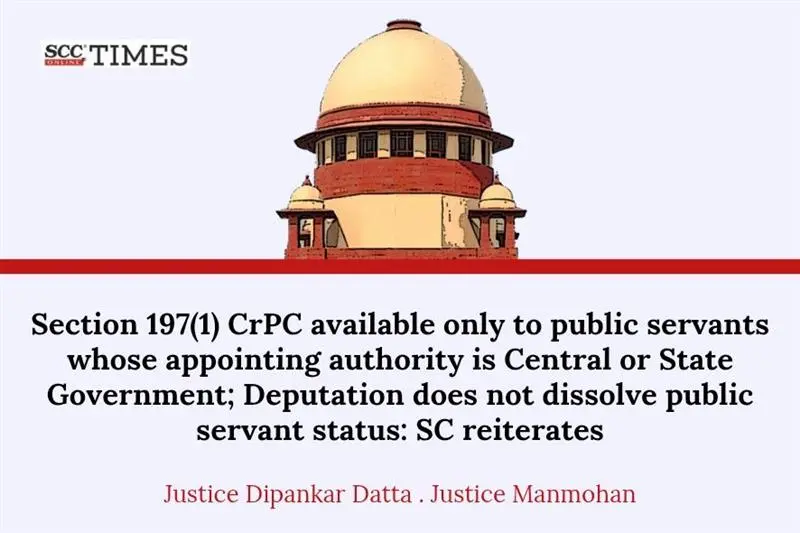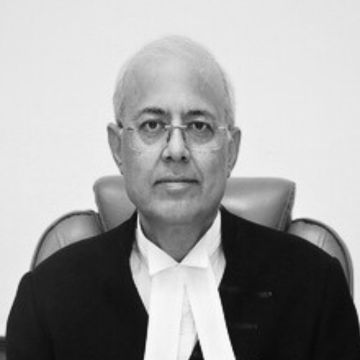Supreme Court: In a set of two criminal appeals against the Punjab and Haryana High Court’s decision, whereby the revision petition of the accused against the decision of the Special Court (CBI) dismissing the accused’s application for discharge was partly allowed, the Division Bench of Dipankar Datta* and Manmohan, JJ. dismissed the appeal and upheld the High Court’s decision, while reiterating that the protection of Section 197(1) of the Criminal Procedure Code, 1973 is available only to public servants whose appointing authority is the Central or State Government.
Background
A First Information Report (FIR) was registered under Sections 120B and 420 of the Penal Code, 1860 (IPC) and under Section 13(2) read with Section 13(1)(d) of the Prevention of Corruption Act, 1988 (PC Act) against the accused. It was alleged in the FIR that while the accused was an Executive Engineer, Public Health, Municipal Corporation, Chandigarh, in connivance and collusion with the co-accused, he caused wrongful loss in excess of Rs. 13.66 crore to the Government exchequer by changing the terms and conditions of the Detailed Notice Inviting Tender. A detailed investigation followed, and on completion thereof, a chargesheet dated under Section 173(2), CrPC was filed in the Court of the Special Judge, CBI, Chandigarh. The Special Judge framed charges against the accused persons.
The accused sought discharge on the grounds of the absence of sanction at any stage. The Special Court dismissed the application for discharge, whereafter the High Court, on his application under Section 401 read with Section 482 of the CrPC, passed the impugned order.
While the High Court discharged him in respect of offences punishable under IPC on the ground that no sanction had been obtained as per the statutory mandate contained in Section 197 of the CrPC, the prayer for discharge qua offences alleged against him under the PCA was spurned.
Issue
Whether the High Court was right in holding that a sanction under Section 197, CrPC, not having been obtained, the accused should be discharged for the offences registered under Sections 120B and 420 of the IPC against him.
Analysis and Decision
The Court referred to a catena of decisions, whereby the Court dealt with the application of Section 197 of the CrPC, wherein several officers/ employees at different positions were involved. In Mohd. Hadi Raja, it was held that officers who are removable from service by authorities other than the Government were not entitled to invoke Section 197 of the CrPC. Whether a Class 1 officer of the Government of Haryana deputed to work as Managing Director of a cooperative society was entitled to protection under Section 197(1) of the CrPC, in N.K. Sharma, it was held that no sanction was required in the case therein as the appellant’s salary was not paid by the Government nor was he at the relevant time in service of the State, thereby, not satisfying the requirements of being a “public servant” within the meaning of Section 197 of the CrPC.
In V. Padmanabhan Nair it was held that an accused facing prosecution for offences under the PC Act cannot claim any immunity on the ground of want of sanction, if he ceased to be a public servant on the date when the court took cognizance of the offence.
Regarding deputation, the Court underscored that where exigency of public service requires the parent department (lending authority) to send its employee on deputation to the receiving department (borrowing authority) and such an arrangement is preceded by a consensus among the three, i.e., the lending authority, the borrowing authority and the officer/employee, the statutory rules do normally provide for his repatriation. In such a case, there can be no severance of relationship with the parent department. However, during the period the officer/employee is sent on deputation to the receiving department, the parent department may fill up the post vacated by the deputationist in accordance with law under the category of ‘deputation vacancy’, which also is not unknown in public service law, but it is only for a limited period till the officer/employee is repatriated.
In the matter at hand, the Court noted that the accused was initially appointed by the Government of Punjab. He was sent on deputation to the Union Territory, Chandigarh from the State of Punjab. Later, he was relieved to join a new assignment in the Municipal Corporation, Chandigarh. From time to time, the Governor of Punjab extended the deputation period of the accused with the Municipal Corporation, Chandigarh. The Court explained that in case the accused, while on deputation, were to commit a misconduct warranting either dismissal or removal, it was not shown by referring to statutory rules that upon the accused’s assignment on deputation, disciplinary control over him stood transferred from any authority of the Government of Punjab to an authority of equal rank in the Municipal Corporation, Chandigarh and such authority had been empowered to take disciplinary action against the accused. In the absence thereof, neither the Board of the Municipal Corporation, Chandigarh, nor its Municipal Commissioner had the authority or jurisdiction to take disciplinary action against the accused had he misconducted himself while discharging his duty under such corporation.
The Court relied on A. Sreenivasa Reddy v. Rakesh Sharma, (2023) 8 SCC 711 where a coordinate Bench held that protection of Section 197 (1) of the CrPC is available only to such public servants whose appointing authority is the Central Government or the State Government and not to every public servant.
Hence, the Court pointed out that while rendering service for the State of Punjab as well as the administration of the Union Territory, the accused was a public servant covered by clause (a) of the 12th description in Section 21 of the IPC and despite his assignment on deputation to the Municipal Corporation, Chandigarh, he continued to remain a public servant for the purposes of Section 197 (1) of the CrPC, being removable from office by an appropriate authority in the Government of Punjab and none else.
Thus, the contention that the accused ceased to be a public servant upon being sent on deputation first to the Union Territory and later to the Municipal Corporation, Chandigarh. Conclusively, the impugned decision was upheld by the Court.
CASE DETAILS
|
Citation: Appellants : Respondents : |
Advocates who appeared in this case For Appellant(s): For Respondent(s): |
CORAM :










